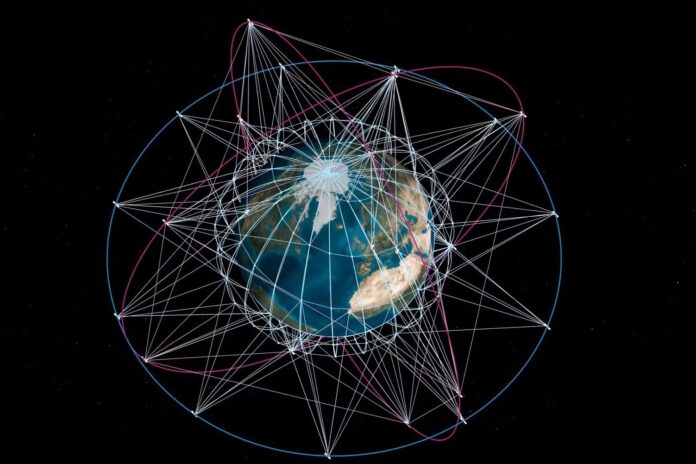Both operators are signalling their intention to back European satellite ventures
Eutelsat and Orange have reinforced their partnership with new multi-year low Earth orbit (LEO) agreement, leveraging Eutelsat’s OneWeb constellation. The deal follows a similar deal March, where Orange and Canada’s Telesat signed a multi-year partnership for Telesat Lightspeed LEO satellite connectivity and terrestrial infrastructure. Both announcements form a not-too-subtle message that Europe’s largest operators are not going to sit around and rely on US constellations, Starlink and Kuiper.
As part of the jockeying, Deutsche Telekom also announced it will be supporting Europe’s IRIS2 project, the delayed multi-orbit sovereign broadband constellation – which stands for Infrastructure for Resilience, Interconnectivity and Security by Satellite – that will comprise 282 satellites on various orbits and the associated ground segment to provide governmental services by 2030 while enabling commercial services. Of these, 264 satellites will be in LEO, which will be responsible for communication services, and 18 medium-Earth orbit (MEO) satellites, which will add global coverage and dedicated services.
In November, a consortium of European satellite operators comprising SES , Eutelsat and Hispasat – calling themselves SpaceRISE – was awarded the contract to develop, deploy and operate the EU’s new secure connectivity satellite system. For Eutelsat, the current geopolitical climate has proved a bit of a bonanza. Add to this mix Vodafone announcing plans in March to pull closer to AST SpaceMobile and create a jointly owned European satellite company to provide direct-to-device services to mobile operators, named SatCo [for now].
Strategic importance for Orange
For Orange’s EVP international networks Jean Louis Le Roux, it is pretty clear. “It is of strategic importance for Orange to invest in the unique LEO European solution that provides best in class, resilient, tailored and sovereign digital connectivity services to serve our customers wherever they are located,” he said. “The partnership with Eutelsat for OneWeb services is of vital importance to support their digital transformation.”
Orange and Eutelsat enjoy a long-standing partnership. Orange is the exclusive reseller of KONNECT VHTS capacity for consumer broadband in France under an agreement dating back to 2020, while earlier this year Orange Middle East and Africa inked an agreement for capacity on the EUTELSAT KONNECT satellite to deliver satellite internet over its footprint.
Through this latest investment, Orange aims to strengthen its satellite solutions portfolio with LEO connectivity solutions providing high throughput, low latency, resilient and sovereign services to its enterprise and government customers wherever they are located and support mobile backhauling globally.
“Eutelsat is delighted to further reinforce its relationship with Orange and looks forward to supporting its ambitious project to provide premium, ubiquitous connectivity to its customers,” said Eutelsat president of the connectivity business unit Cyril Dujardin. “LEO-enabled services are becoming an integral technology for global telco operators. We are delighted to have been selected by Orange to enhance its service to its enterprise customers.”
Telekom’s vote of confidence
Deutsche Telekom was already slated as a partner to IRIS2 and its latest announcement doesn’t add too much to that besides giving the information that it is contributing to the project with its “core topics of connectivity and IT infrastructure”. The object of the contract is the design of advanced IT and data centre services, secure networks (WAN) and a 5G core network.
The carrier said connectivity from space will enhance different domains in the future. These include, for example, surveillance, civil protection, crisis management, the protection of critical infrastructure and the issues of national security and resilience in Europe. There will also be a broadband offer for B2B customers.
“Our continent needs connectivity that is both secure and modern. With IRIS2, we achieve exactly that and strengthen Europe’s technological sovereignty. Telekom is contributing to the cross-border digital infrastructure of tomorrow, always with the focus on people,” said Deutsche Telekom’s outgoing board member for technology & innovation Claudia Nemat.
Telekom emphasised the satellite constellation strengthens Europe’s technological sovereignty, addressing urgent long-term challenges in the areas of security, safety and resilience. The carrier went further stating the constellation will underpin “Europe’s strategic autonomy”.



